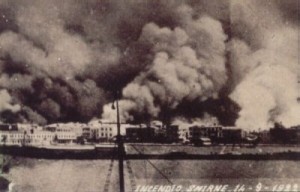At the beginning of the 20th century, the great city of Smyrna on the Anatolian coast was one of the world’s richest, most cosmopolitan and ethnically diverse metropolises – containing large Armenian and Jewish communities, as well as twice as many Greeks as then lived in Athens. Indeed, as the possible birth place of Homer himself, Greece had a long and deeply-embedded history with this most ancient city. But on September 13th 1922, victorious Turkish soldiers at the end of the three-year-long Greco-Turkish War lit fire to Smyrna’s Armenian and Greek quarters and went on a rampage of rape, pillage and mass murder. Soon, all but the Turkish quarter of the city was in flames as hundreds of thousands of refugees crowded the waterfront, desperate to escape. In the harbour were no less than twenty-one international battleships – including eleven British, five French and three large American destroyers. But on orders of their respective governments anxious to protect oil and trade interests in the area, all watched on passively as thousands of people were massacred in cold blood. The British poured boiling water on desperate refugees who swam up to their vessels, while America’s official representative insisted that journalists cable home reports favourable to the Turks. In a week of utter bloody carnage, the ancient city of Smyrna was entirely snuffed out; by the time its dying embers cooled, as many as 100,000 people had been killed and millions left homeless. There followed a massive cover-up by tacit agreement of those same Western Allies who had defeated the Ottoman Empire just four years earlier in World War I. The destruction of Smyrna – one of the great atrocities of the early 20th century – has subsequently been all but expunged from historical memory.
This colossal catastrophe had many causes. While Mustafa Kemal Atatürk’s conquering soldiers were the same mass murderers responsible for the Armenian genocide, the Greeks themselves were not guiltless of perpetrating acts of atrocity upon the Turks throughout the course of their somewhat overreaching quest to reclaim and re-Christianise the Asia Minor territories lost to the Ottoman Empire. But the primary finger of culpability must be pointed squarely at a reckless and imperialistic post-WWI policy of meddlesome intervention that went disastrously wrong.
British Prime Minister David Lloyd George and American President Woodrow Wilson both shared a simplistic support for the Greeks that lacked any deep understanding of the wide-ranging and longstanding ethnic complexities in the region. The landing of the Greek army in Smyrna in May 1919 was in truth part of a cynical campaign by the Western Allies to carve up the territories of the fallen Ottoman Empire for their own self-serving purposes, and they were only too quick to change sides when it suited them. Just one year after the tragedy at Smyrna, the Allies formally recognised the Republic of Turkey with the signing of the Treaty of Lausanne, thus legitimising the Turkish Nationalist program of ethnic cleansing and genocide, and reversing all terms of the 1920 Treaty of Sèvres which had legally obligated the Turkish government to bring accused war criminals to justice.
And while those Allied troops ignored the screams of the burning, drowning victims of their leaders’ machinations – some admirals even going so far as to order marching bands to play in order to silence the desperate pleas for help – it is interesting to note that the only rescue bids launched were by heroic civilians, and a nearby Japanese freighter that dumped all of its cargo and filled itself to the brink with refugees.



10 Responses to 13th September 1922 – The Destruction of Smyrna